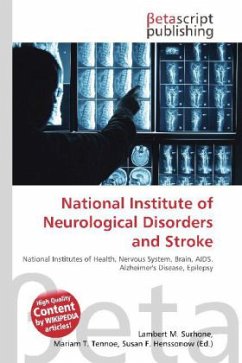
National Institute of Neurological Disorders and Stroke
Versandkostenfrei!
Versandfertig in 6-10 Tagen
39,99 €
inkl. MwSt.

PAYBACK Punkte
20 °P sammeln!
Please note that the content of this book primarily consists of articles available from Wikipedia or other free sources online. The National Institute of Neurological Disorders and Stroke (NINDS) is a part of the U.S. National Institutes of Health (NIH). It conducts and funds research on brain and nervous system disorders and has a budget of just over US$1.5 billion. The mission of NINDS is "to reduce the burden of neurological disease a burden borne by every age group, every segment of society, and people all over the world". NINDS has established two major branches for research: an extramura...
Please note that the content of this book primarily consists of articles available from Wikipedia or other free sources online. The National Institute of Neurological Disorders and Stroke (NINDS) is a part of the U.S. National Institutes of Health (NIH). It conducts and funds research on brain and nervous system disorders and has a budget of just over US$1.5 billion. The mission of NINDS is "to reduce the burden of neurological disease a burden borne by every age group, every segment of society, and people all over the world". NINDS has established two major branches for research: an extramural branch that funds studies outside the NIH, and an intramural branch that funds research inside the NIH. Most of NINDS'' budget goes to research extramural research. NINDS'' basic science research focuses on studies of the fundamental biology of the brain and nervous system, genetics, neurodegeneration, learning and memory, motor control, brain repair, and synapses. NINDS also funds clinical research related to diseases and disorders of the brain and nervous system, e.g. AIDS, Alzheimer''s disease, epilepsy, muscular dystrophy, multiple sclerosis, Parkinson''s disease, spinal cord injury, stroke, and traumatic brain injury.












